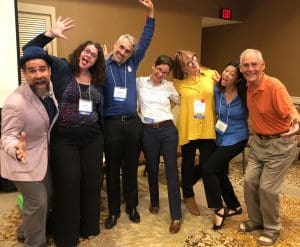Transforming Conflict Before it Goes to Court. Member Spotlight: Mary Leichliter
“The reason why I am passionate about this work is because I think we should be having those difficult conversations more frequently, and mediation provides exactly that opportunity, that container capable of giving people the time to literally sit down, talk and listen actively”, Mary Leichliter says enthusiastically, while explaining the motivations that guided her transition from the law field to mediation. Mary is an experienced mediator and facilitator based in the San Francisco Bay Area, California, with nearly 1000 disputes mediated throughout the course of her career. With strong expertise and personal commitment in a matter of anti-discrimination, Mary specializes in preventive mediation and early resolution of cases before they are brought to court, and emotions are inflamed, positions entrenched. Mary has also been an active member of MBBI for about 10 years, during which she took part in the United Nations Multilateral Working Group.
A civil rights lawyer…
 Mary began her career as a trial attorney and litigator, having practiced for nearly 20 years, prior to transitioning to mediation. Mary recounts that becoming a lawyer had been her dream since she was very little and that the civil rights area had always moved her deeply. “I do not know exactly where this passion stemmed from, probably from some childhood experiences. I know I have always wanted to use my mind honestly to help other people in a meaningful way”. This is why Mary decided to attend the University of Michigan Law School. After working on reproductive rights in Ireland on a fellowship from UM Law, Mary returned to the United States to focus on employment and labor law. From 1994 to 2012, she practiced labor and employment law with Bay Area law firms and in her own practice, handling all aspects of civil litigation, from the trial in state and federal court through appeal. Mary has always valued the attorney-client relationship, feeling rewarded and fulfilled by the possibility of establishing a positive connection with her clients; something that signaled her future engagement as a mediator. “I feel like the seeds of my mediation practice were there from the beginning, and they developed thanks to my desire to build collaborative relationships with my clients, based on honesty, transparency, and excellent communication”. Evidently, the cornerstones of the ‘good’ mediator were already there.
Mary began her career as a trial attorney and litigator, having practiced for nearly 20 years, prior to transitioning to mediation. Mary recounts that becoming a lawyer had been her dream since she was very little and that the civil rights area had always moved her deeply. “I do not know exactly where this passion stemmed from, probably from some childhood experiences. I know I have always wanted to use my mind honestly to help other people in a meaningful way”. This is why Mary decided to attend the University of Michigan Law School. After working on reproductive rights in Ireland on a fellowship from UM Law, Mary returned to the United States to focus on employment and labor law. From 1994 to 2012, she practiced labor and employment law with Bay Area law firms and in her own practice, handling all aspects of civil litigation, from the trial in state and federal court through appeal. Mary has always valued the attorney-client relationship, feeling rewarded and fulfilled by the possibility of establishing a positive connection with her clients; something that signaled her future engagement as a mediator. “I feel like the seeds of my mediation practice were there from the beginning, and they developed thanks to my desire to build collaborative relationships with my clients, based on honesty, transparency, and excellent communication”. Evidently, the cornerstones of the ‘good’ mediator were already there.
… turned into a full-time mediator.
As much as litigation processes can be effective in giving a clear-cut solution to a dispute, trials are far from efficient, keeping the parties involved under constant pressure from both the psychological and financial points of view. “I loved being in trial, but at a certain point, I started feeling that litigation is a very long, expensive, and stressful process. This is why I slowly got interested in helping people in a more efficient manner and in a way that allows them to determine what may work as a solution to their experience.” Mary viewed mediation as the opportunity to combine a more productive way of solving disputes with the possibility of expressing skills beyond those traditionally used in litigation. “I became passionate about working as a mediator because I wanted to express and hone skills such as communication, empathy and the ability to connect with the people involved in the conflict, to unearth and explore what was really causing the conflict”
Starting in 2006, when she completed her first 40-hour mediation training, Mary worked hard to realize this yearning. Little by little, she enriched her attorney practice with mediation tools, which helped her handling several employment and divorces cases leading to more constructive outcomes. She also volunteered for the SEEDS Community Resolution Center, a local mediation centre based in Berkeley. She could not feel more fulfilled by this experience. “I loved the opportunity to connect with people from all kinds of background experiences, with all kinds of needs” Mary recounts. Finally, in 2012, Mary could achieve her dream, becoming a full-time mediator both privately and within the public sphere. Indeed, she was hired by the State of California as Senior Mediator for the Department of Fair Employment & Housing. She passionately holds this position still today, finding ever-renewed motivation in serving the public interest and, above all, assisting those people who would have not enough resources to defend themselves. Besides her ongoing passion, this position represented fertile ground to boost Mary’s mediation expertise. Thanks to her keen competence in matters of discrimination, she works with challenging and often emotionally charged cases on a regular basis, given the sensitivity of the issues at stake, including claims of discrimination in the workplace and in housing. The expertise and recognition this role gave to Mary allowed her to start her own mediation firm, ReSOLVE, specializing in resolving discrimination cases arising out of the employment relationship. So far, these have included race, sex, age, national origin, disability, pregnancy, and religious discrimination cases, along with retaliation and sexual harassment cases. Last but not least, Mary mediates federal cases as a member of the United States District Court Mediation Panel.
Early resolution of disputes.
 Although Mary’s portfolio is broad and diverse, her practice as a mediator features one specialty, which is pre-filing or pre-litigation mediation. Shortly, Mary intervenes seeking to resolve cases before an official lawsuit is filed, or shortly after. “I feel strongly that many litigation cases I see could have been avoided if people would have taken the time to really sit down and talk it through, perhaps with an external facilitator or mediator”, she concedes. Upholding this belief, Mary works closely with the business sector and companies, supporting them in handling cases involving discriminatory issues before they become legal proceedings. “I am very interested in having inclusive conversations, which I think can be valuable for the parties who work together to get a better sense of where the other’s stance comes from, even if they do not end up agreeing with the co-worker, the understanding allows them to let it go a little and continue a productive working relationship”. Considering Mary’s outstanding success rate, she has assisted numerous employers and employees avoid burdensome legal procedures by resolving internal tensions in a quicker, cheaper, and more effective way.
Although Mary’s portfolio is broad and diverse, her practice as a mediator features one specialty, which is pre-filing or pre-litigation mediation. Shortly, Mary intervenes seeking to resolve cases before an official lawsuit is filed, or shortly after. “I feel strongly that many litigation cases I see could have been avoided if people would have taken the time to really sit down and talk it through, perhaps with an external facilitator or mediator”, she concedes. Upholding this belief, Mary works closely with the business sector and companies, supporting them in handling cases involving discriminatory issues before they become legal proceedings. “I am very interested in having inclusive conversations, which I think can be valuable for the parties who work together to get a better sense of where the other’s stance comes from, even if they do not end up agreeing with the co-worker, the understanding allows them to let it go a little and continue a productive working relationship”. Considering Mary’s outstanding success rate, she has assisted numerous employers and employees avoid burdensome legal procedures by resolving internal tensions in a quicker, cheaper, and more effective way.
Mary’s winning card? Primarily, empathy and the ability to connect deeply with people are key innate capacities at her disposal to win the confidence of the parties and to build a safe environment where individuals can have the time and space to have those difficult conversations which, according to Mary, are so necessary to get at the heart of the problem. “During the mediation process, I first try to earn the parties’ trust, showing understanding and creating a genuine relationship of empathy so that I can find out what their interests are, what they need and what might help them unearthing the best solution for themselves”, she accounts. Especially, Mary places much value on the capacity of the mediator to listen deeply. It may sound simplistic, but active and thoughtful listening really owns the power to create a connection with the parties concerned and makes a huge difference in the way these latter perceive the mediator. “Deep, sincere listening with the goal of understanding, empathizing, and validating is the key that creates true connections, and those connections allow them to trust me as a person. This helps me to deliver difficult information to the parties, and to them reconsidering their beliefs and viewpoints on the matter at stake”. As it stands out from Mary’s words, securing trust is imperative to ensure success in the mediation practice.
A message of hope.
Ultimately, Mary wants to leave a message of hope towards the dire situation in which the United States currently are, and how mediation can make its contribution: “also at the macro-level, thinking about the recent social movements in the US such as the Black Lives Matter, conflict might be prevented from exploding. I do not operate under the illusion that all systemic issues can be resolved through mediation, but I believe they could start to be addressed in a more open and transparent way. This might allow those involved to really come, sit and talk with each other, assessing viable courses of actions to solve these systemic problems”. As a leading mediation organization, MBBI is highly proactive on this topic. Acting double-fold, the organization has sought to prevent conflict before, during, and after the United States elections through the Trust Network. Besides, it is committed to empowering conflict-scourged communities and individuals with conflict resolution know-how.
And you? Are you ready to get on board?
Written by Matteo Piovacari: MBBI Writer
